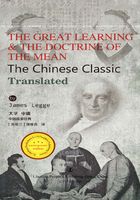
CHAPTER III
1. In the Book of Poetry, it is said, "The imperialdomain of a thousand le is where the people rest."
2. In the Book of Poetry, it is said, "The twitteringyellow bird rests on a corner of the mound." The Master said, "When it rests, it knows where to rest. Is it possible that a man should not be equal to this bird?"
3. In the Book of Poetry, it is said, "Profound wasKing Wăn. With how bright and unceasing a feeling of reverence did he regard his resting places!" As a sovereign, he rested in benevolence. As a minister, he rested in reverence. As a son, he rested in filial piety.As a father, he rested in kindness. In communication with his subjects, he rested in good faith.


The subject of the ode is the praise of king Wăn,whose virtue led to the possession of the empire by his house, more than a thousand years after its first rise.
4. 君子 is here the man of rank and office probably,as well as the man of virtue; but I do not, for my own part, see the particular relation of this to the preced.parr., nor the work which it does in relation to the whole chapter.
CHAPTER 3. ON RESTING IN THE HIGHEST EXCELLENCE.
The frequent occurrence of 止 in these paragraphs,and of 至善, in par.4, led Choo He to combine them in one chapter, and connect them with the last clause in the opening par. of the work.
1. See the She-king, IV. iii. Ode III. st. 4. The ode celebrates the rise and establishment of the Shang or Yin dynasty. 畿 is the 1000 le around the capital,and constituting the imperial demesne. The quotation shows, according to Choo He, that 物各有所当止之处, 'every thing has the place where it ought to rest'.But that surely is a very sweeping conclusion from the words.
2. See the She-king, II. viii. Ode VI. st. 2., where we have the complaint of a down-trodden man,contrasting his position with that of a bird. For 缗here, we have 绵 in the She-king. 缗蛮 are intended to express the sound of the bird's singing or chattering. 'The yellow bird' is known by a variety of names.


4. In the Book of Poetry, it is said, "Look at thatwinding course of the K'e, with the green bamboos so luxuriant! Here is our elegant and accomplished prince! As we cut and then file; as we chisel and then grind: so has he cultivated himself. How grave is he and dignified! How majestic and distinguished!Our elegant and accomplished prince never can be forgotten. " That expression—"as we cut and then file",indicates that of self culture. "How grave is he and dignified!" indicates the feeling of cautious reverence."How commanding and distinguished", indicates an awe-inspiring deportment.


A common one is 仓庚, or, properly, 鸧鹒, ts'angkang. It is a species of oriole. The 子曰 are worthy of observation. If the first chapter of the classical text,as Choo He calls it, really contains the words of Confucius, we might have expected it to be headed by these characters. 于止, lit., 'in resting'.
3. See the She-king, III. i. Ode I. st. 4. The stress is here all laid upon the final 止, which does not appear to have any force at all in the original, Choo He himself saying there that it is 语词, 'a mere supplemental particle'. In 於缉, 於 is read woo , and is an interjection.
4. See the She-king, I. v. Ode I. st. 1. The ode celebrate the virtue of the duke Woo (武) of Wei (卫),in his laborious endeavours to cultivate his person.There are some verbal differences between the ode in the She-king, and as here quoted; namely, 奥 for 澳; 绿for 菉; 匪 for 斐. 猗, here, poetice , read O . 道 is used as=言, 'says', or 'means'. It is to be understood before自修, 恂慄, and 威仪.—The transposition of this par.by Choo He to this place does seem unhappy. It ought evidently to come in connection with the work of 修身.
5. See the She-king, IV. i. Sect. I. Ode IV. st. 3. The former kings are Wănand Woo, the founders of the Chow dynasty. 於献 are an interjection, read woo hoo. In the She-king we have 於乎. 乌呼 are found with the same meaning. I translate 其贤, 其亲, by 'what they deemed worthy', 'what they loved'. When we try to determine what that what was, we are perplexed by the varying views of the old and new schools.


"Our elegant and accomplished prince never can be forgotten", indicates how, when virtue is complete and excellence extreme, the people cannot forget them.
5. In the Book of Poetry, it is said, "Ah! the formerkings are not forgotten ."Future princes deem worthy what they deemed worthy, and love what they loved.The common people delight in what they delighted,and are benefited by their beneficial arrangements. It i on this account that the former kings, after they have quitted the world, are not forgotten.
The above third chapter of commentary explains resting in the highest excellence.